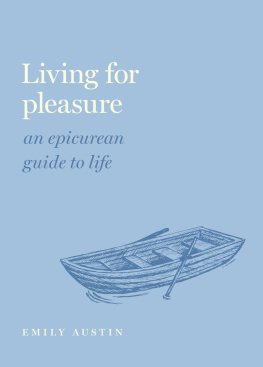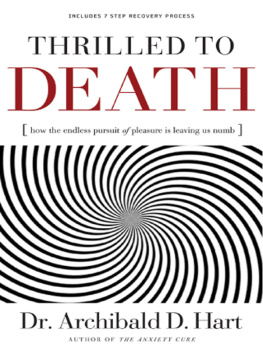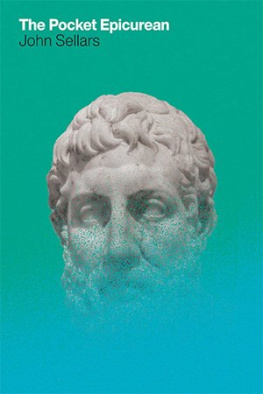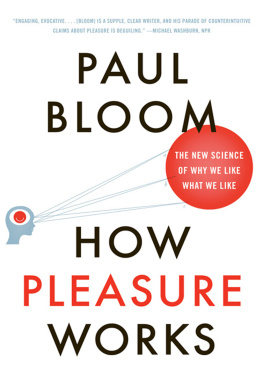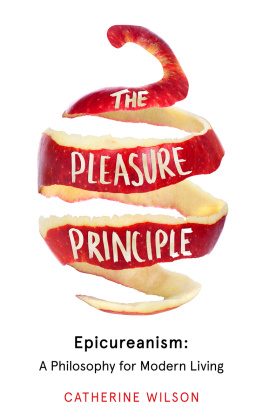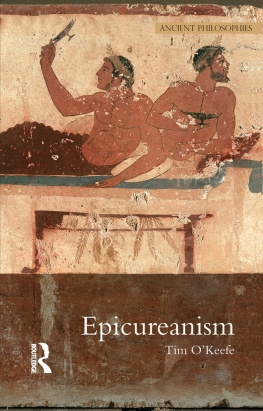Living for Pleasure
GUIDES TO THE GOOD LIFE
Stephen Grimm, Series Editor
Seeing Clearly: A Buddhist Guide to Life
Nicolas Bommarito
On Being and Becoming: An Existentialist Approach to Life
Jennifer Anna Gosetti-Ferencei
Choosing Freedom: A Kantian Guide to Life
Karen Stohr
Growing Moral: A Confucian Guide to Life
Stephen C. Angle
Living for Pleasure: An Epicurean Guide to Life
Emily A. Austin

Oxford University Press is a department of the University of Oxford. It furthers the Universitys objective of excellence in research, scholarship, and education by publishing worldwide. Oxford is a registered trade mark of Oxford University Press in the UK and certain other countries.
Published in the United States of America by Oxford University Press
198 Madison Avenue, New York, NY 10016, United States of America.
Oxford University Press 2023
All rights reserved. No part of this publication may be reproduced, stored in a retrieval system, or transmitted, in any form or by any means, without the prior permission in writing of Oxford University Press, or as expressly permitted by law, by license, or under terms agreed with the appropriate reproduction rights organization. Inquiries concerning reproduction outside the scope of the above should be sent to the Rights Department, Oxford University Press, at the address above.
You must not circulate this work in any other form and you must impose this same condition on any acquirer.
CIP data is on file at the Library of Congress
ISBN 9780197558324
eISBN 9780197558348
DOI: 10.1093/oso/9780197558324.001.0001
For my parents
Table of Contents
Several ancient philosophers held that the point of studying ethics was not just to learn about ethicsas one might learn about chemistry, astronomy, or historybut to become a better human being. They also recognized that this was not easy to do. In order for thinking about ethics to make a difference in our lives, our habits and inclinations needed to be educated right alongside our minds. They therefore claimed that what mattered to living well was not just what we thought but how we thought, and not just how we thought but how we emotionally responded to the world and to other people.
The books in this series highlight some of the transformative ideas that philosophers have had about these topicsabout the good life, and the practices and ways of life that help us to pursue it. They tell us what various philosophers and traditions have taken to be most important in life, and what they have taken to be less important. They offer philosophical guidance about how to approach broad questions, such as how to structure our days, how to train our attention, and how to die with dignity. They also offer guidance about how to deal with the sort of everyday questions that are often neglected by scholars, but that make up the texture of our lives, such as how to deal with relationships gone wrong, family disruptions, unexpected success, persistent anxiety, and an environment at risk.
Because the books are written by philosophers, they draw attention to the reasons and arguments that underlie these various claimsthe particular visions of the world and of human nature that are at the root of these stances. The claims made in these books can therefore be contested, argued with, and found to be more or less plausible. While some answers will clearly compete with one another, other views will likely appear complementary. Thus, a Confucian might well find that a particular practice or insight of, say, Nietzsches helps to shed light on his or her way of living in the world, and vice versa. On the whole, the idea is that these great philosophers and traditions all have something to teach us about how to be more fully human, and more fully happy.
Above all, the series is dedicated to the idea that philosophy can be more than just an academic disciplinethat it can be, as it was for hundreds of years in the ancient world, a way of life. The hope is also that philosophy can enhance the ways of life we already feel pulled toward and help us to engage with them more authentically and fully.
Stephen R. Grimm
Professor of Philosophy
Fordham University
Imagine yourself on vacation. Not everyone enjoys beaches, and some people would rather eat sand than sleep in the woods. Maybe you prefer to vacation in your living room. Now that youve figured out where you are, whos there? You, obviously, but people rarely want to be entirely alone for all that long because were social creatures. You might be with your romantic partner, or maybe your children or some close friends. Maybe youre there with George Clooney because why not?
Think about what it would mean for the trip to go well, like really well. You are in love. Your children put away their phones and are excited about what you are making for dinner. Your best friends gently tease you about that time you threw up outside of Waffle House. You make a playlist, and people say I love this song about every song. Weve clearly stumbled into my imagination at this point, so your results may vary.
Now, what is the weather like? That ones easythe weather is perfect, as is the food. Maybe you see some wonders of the world, or maybe you spend the afternoon reading books and watching movies. You go out dancing or you wear flannel pajamas all day. How long are you staying on vacation? Perhaps forever.
If I were giving a TED talk, I might ask you what single word applies to all of these features of your imaginary vacation. And then, after a pregnant pause, the tone of my voice would soften and I would answer my own questionPleasure. Your days are shot through with pleasures. Even your dreams are pleasant! The story doesnt fulfill its ambition unless you are feeling some kind of pleasure at every turn.
You might understand, then, how the Ancient Greek philosopher Epicurus could find himself thinking that pleasure is the source of our happiness and the only truly good thing. The technical term for this view is hedonism. As Epicurus puts it in his notoriously wooden prose, pleasure is the starting point and the goal of living blessedly. Happiness begins and ends in pleasure.
But surely that cant be right! Telling someone to aim at pleasure seems like a very unpromising starting point for a self-improvement plan, much less an ethical approach to living. It sounds more like a recipe for insurmountable credit card debt, a series of failed relationships, and a life-long problem with alcohol. Ethics is demanding, but pursuing pleasure seems all too easy and all too destructive. We dont need some old philosopher like Epicurus giving license to our failures of self-control and calling it ethics and happiness.
The last thing we should do is cavalierly dismiss Epicurus as a debauched glutton, but lets not lose sight of how powerfully liberating it can be to hear that pleasure is good. Some people are raised to be ashamed of perfectly natural bodily desires, and others are simply tired of feeling guilty for buying an afternoon latte. Sometimes you just want to ask for avocado on your sandwich without worrying that the person behind you in line is thinking, That avocado, son, is the reason youll never own a home! More importantly, pleasures both large and small give shape and color to our lives, and any philosophy that denies their genuine value seems to promise little more than a steady diet of cold gruel for the soul. Unlike some other philosophers you might have encountered, Epicurus is no prudish killjoy.

